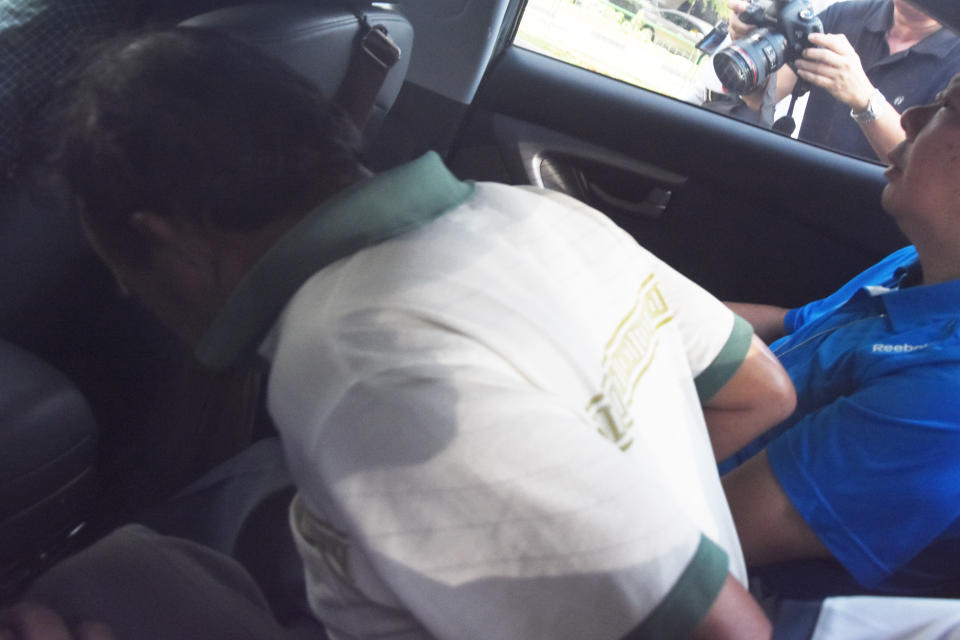Fugitives on the run: Suspects extradited back to Singapore in recent years

SINGAPORE — A recent case of an Indonesian maid who cannot be extradited to Singapore has thrown the spotlight on bilateral treaties and agreements governing the transfer of offenders to jurisdictions where their original crimes are committed.
Khasanah, who killed her elderly employers here in 2017 and then fled to her home country, cannot be extradited to Singapore as the two countries do not have an extradition treaty in force, a coroner’s court heard on Tuesday (1 September).
The maid, who goes by one name, is currently serving a 20-year jail term in Indonesia after she was convicted of killing Chia Ngim Fong, 79, and his wife Chin Sek Fah, 78, in their Bedok Reservoir Road home.
Under Indonesian law, citizens can be tried for offences committed overseas. The Singapore police had shared their investigation results with the Indonesian authorities to secure Khasanah’s conviction.
Although Singapore and Indonesia signed an extradition treaty in 2007, Indonesian lawmakers have yet to ratify it.
Currently, the Republic has bilateral extradition treaties with the United States, Hong Kong and Germany; and extradition agreements with 40 Commonwealth countries under the London Scheme for extradition within the Commonwealth. These countries include Australia, India, Canada, New Zealand and the United Kingdom.
Singapore also has special extradition arrangements with Malaysia and Brunei on the basis of mutual acceptance of arrest warrants.
Some international laws of which Singapore is a signatory also allow for extraditions – for example, the International Convention against the Taking of Hostages and the International Convention for the Suppression of Terrorist Bombings.
Singapore is also actively engaged in negotiations for an Asean extradition treaty.
Here’s a look back at some fugitives who fled from Singapore in recent times but were brought back.
Alleged Stanchart robber David James Roach
Canadian national David James Roach, 30, allegedly robbed the StanChart Bank branch in Holland Village of $30,000 on 7 July 2016, and then fled to Thailand.
He was arrested in Bangkok a few days later, but he could not be brought back to Singapore as the Republic and Thailand do not have an extradition treaty.
On 11 January 2018, Roach was deported from Thailand after serving a jail term for committing offences in the country, and arrived in London the same day.

Singapore then sought the assistance of the British authorities to arrest Roach, with a view to secure his extradition to Singapore.
In October 2018, the UK Secretary of State ordered Roach’s extradition, after a magistrate ruled that it would be lawful. The Singapore government had acceded to the United Kingdom’s request not to cane Roach if he is found guilty of robbery; the offence carries a mandatory minimum of six strokes of the cane.
UK extradition laws prohibit the UK from extraditing suspects in the absence of such an assurance.
Roach then mounted several legal challenges against the extradition, which were ultimately unsuccessful.
He arrived in Singapore on 17 March to face charges of robbery and money laundering.
He is scheduled to enter a guilty plea at the State Courts on 1 October.
Alleged errant lawyer Jeffrey Ong
Singaporean lawyer Jeffrey Ong Su Aun, 42, disappeared in May last year after some $33 million held in escrow by his law firm went missing.
He allegedly fled to Malaysia after being pressed to account for the unauthorised withdrawals of client monies by the partners in his law firm on 13 May.
He became uncontactable three days later and a police report was made about his alleged criminal breach of trust on 21 May.

A warrant of arrest for Ong was then issued on 25 May, leading to his arrest by the Malaysian police in a hotel room four days later. Among his possessions was a stolen Malaysian passport belonging to a Malaysian Chinese man, whose face and age were similar to Ong’s.
Ong was repatriated to Singapore and charged at the State Courts on 1 June with one count of cheating.
He has since received 57 charges in all – for cheating, forgery and criminal breach of trust as an attorney.
Police investigations are ongoing.
If found guilty of criminal breach of trust as an attorney, Ong faces life imprisonment or a jail term of up to 20 years along with a possible fine.
Alleged pistol bearer Seow Lam Seng
A police spot check on two men, Seow Lam Seng and Lee Ah Fatt, along Tanjong Katong Road in 1980 turned deadly when Lee drew a pistol on officers, resulting in Lee being fatally wounded.
Seow, who was allegedly carrying a pistol, fled amid the commotion.
The suspect remained at-large for almost four decades, even as the police regularly reviewed their case files in an attempt to get to him.

Finally on 22 March 2018, the long arm of the law caught up with the then 63-year-old suspect when he was arrested by the Malaysian police in the state of Penang.
Seow, a Malaysian, was brought back to Singapore two days later and charged in the State Courts on 26 March 2018 with one count under the Arms Offences Act.
He is accused of unlawfully carrying a pistol at his waist at around 2.30pm on 3 October 1980 at a staircase next to the Sin Po Po Bar.
Seow’s case is before the courts.
He faces life behind bars if found guilty of the crime.
Kovan double murderer Iskandar Rahmat
Police senior staff sergeant Iskandar Rahmat, then 34 and heavily in debt, brutally murdered car workshop owner Tan Boon Sin, 67, and his son Chee Heong, 42, after a botched robbery on 10 July 2013.
He fled to Malaysia but was swiftly arrested by Malaysian police at an eatery in Johor Bahru on 12 July and sent back to Singapore the following day.
While the extradition took place seven years ago, the cold-blooded murders by a cop in broad daylight caused substantial public disquiet and the case remains etched in the minds of many till today.
After the suspect was nabbed, a press conference revealing his identity was held by then-Deputy Prime Minister Teo Chee Hean and police commissioner Ng Joo Hee.

The elder Tan suffered 27 knife wounds on his body, while his son had 20 stab wounds. Chee Heong had been dragged face-down in broad daylight under the car Iskandar drove after his belt got caught to the underside of the car. The victim’s body was dislodged outside Kovan MRT station.
On 4 December 2015, Iskandar received the mandatory death penalty for the double murders.
The Court of Appeal upheld the decision on 3 February 2017.
In early 2018, Iskandar and his family filed clemency petitions to the president, which were rejected in July last year.
Now 41, he remains on death row.
Serial fraudster Ng Chong Lin
Two days before his appeal against a jail term of three years and three months for forgery and other charges was due to be heard in 2003, Ng Chong Lin, then a 31-year-old bankrupt, fled from Singapore using a fake passport.
Over the next seven years, the serial trickster successfully passed off as an attorney and practiced law in the United States using a bogus name, in a tale reminiscent of the popular biographical crime film ‘Catch Me If You Can’. He even got married, earned a good income, and applied for temporary residence in the US in 2007.

But the fraudster was eventually caught out by the US authorities in 2010, and he was jailed for four years for crimes which including aggravated identity theft in impersonating an attorney.
In May 2015, Ng was deported to Singapore. After a trial, he was found guilty at the State Courts in June 2016 for offences relating to his 2003 departure. He was handed a jail term of three years and four months.
Ng then filed an appeal against the State Courts’ decision. In January 2017, the High Court dismissed that appeal, as well as Ng’s outstanding appeal from 2003.
Have a tip-off or a story lead to share with us? If you come across something newsworthy, do e-mail us at sgnews.tips@verizonmedia.com.
In your e-mail, do provide as many details as possible including videos and photos. If you are open to speaking to us as a witness to an incident, please provide your name and contact number.
Stay in the know on-the-go: Join Yahoo Singapore's Telegram channel at http://t.me/YahooSingapore
Related stories:
Bedok double murder: Indonesian maid serving 20 years' jail in home country
2016 StanChart bank robbery suspect extradited to Singapore
Lawyer Jeffrey Ong had stolen Malaysian passport, threw away his mobile phone
Malaysian fugitive nabbed after 38 years on the run charged with firearm possession
Kovan murder trial: Iskandar relates tragic downward spiral that led to crime, and death



